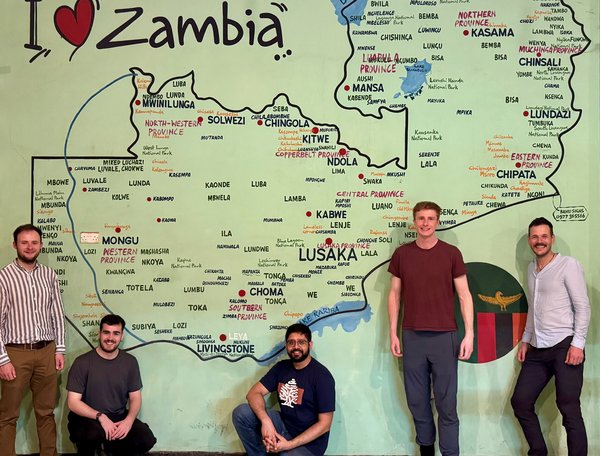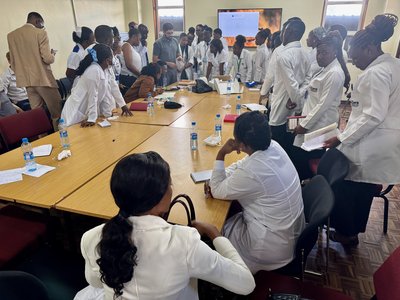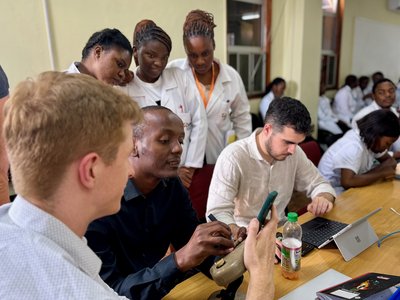Gloucestershire surgeons visit Zambia to support the development of an ENT service
In April this year, a group of ear, nose and throat (ENT) surgeons from Gloucestershire Royal Hospital travelled to Zambia at the request of Lufunda Lukama, an ENT surgeon working in the country.
Consultant ENT surgeon Matthew Clark explains the purpose and outlines his reflections about the trip.
Our team, comprising myself plus Huw Jones (Consultant Otologist, Wrexham, former fellow at Gloucester), Hussein Walijee (current post-CCT otology fellow at Gloucester) and Matt Gamble (middle grade ENT, Gloucester) travelled to Zambia.
The context in Zambia
In a country of 19.6 million, Lufunda Lukama is one of just five ENT specialist surgeons. While the majority of these are based in the capital of Lusaka, Lufunda works up north in Ndola, in the Copperbelt region, effectively responsible for a population of about 10 million. It is not difficult to see the problem that he, and the country as a whole, face. Qualifying in Zambia, he had specialist training in South Africa for five years, during which he researched the challenges faced in delivering an ENT service in Zambia.
In brief, Zambia’s ENT services were found to be deficient at all levels of hospital care, in infrastructure, human resources, and equipment, despite a huge burden of disease. There was poor delivery of surgical procedures and availability of essential medication. Where non-specialist clinicians were managing ENT conditions, there was a high diagnostic error rate, resulting in inappropriate treatment and referrals.
A global focus
ENT UK is the professional membership body representing ear, nose and throat surgery and head, neck and thyroid surgery in the UK. Working with ENT UK's Global Health committee throughout the travel restrictions posed by COVID-19, work began in developing a set of ENT global guidelines. These aim to provide a free, readily-accessible resource for anyone providing ENT care in resource-limited settings. Different levels of advice are provided for village health workers or similar who have no formal ENT training and very limited resources, to those working in formal medical centres yet who are not formally ENT trained and those who have had formal ENT training and may have access to more specialist equipment.
The guidelines are succinct and practical, with a list of topics chosen to be appropriate to the needs of those they serve. They are based on the best evidence and sensitive to different levels of human and physical resource availability. Each chapter has authors from both high and low-resource settings, and authors come from all over the world. It is a work in progress, with completed chapters available through both the ENT UK and Global OHNS websites.
The trip
This trip, at the invitation of the Zambia ENT, Audiology and Speech Therapy Society (ZENTAS), aimed to deliver a temporal bone dissection course (the standard way of training for ear surgery) and a basic ENT training course. It was also largely considered a recce trip to see how best we could help in the future.
Based at the University Teaching Hospital in Lusaka, we were faced with a fantastic, dedicated temporal bone dissection room, well lit, with 4 drilling stations, an appropriate array of instruments, bone holders, new drills, and microscopes with one connected to a large TV screen. It had been donated the year before from a German charity.
Sadly, as I am afraid seems common in many low-resource settings, beyond the superficial view, the situation was less favourable. The three sinks had no running water; two of the drills were completely seized; irrigation tubing was blocked with mould and had become defunct; power was intermittent! In our UK practice, we take it for granted that equipment is serviced between uses. It appears this aspect had not been explained, and the drills in particular had not been cleaned or serviced with two now defunct.
We managed to get two stations working and through the week we got all the 9 residents (SpR equivalents) in the country through their first temporal bones, the majority of whom had never handled a drill. The residents were visibly delighted to be drilling and very enthusiastic to learn. Every single one showed incredible progression of drilling skills throughout their day, learning how to safely apply the drill and sequentially identify the anatomy. It was a wonderful start to their development in being one day able to manage such conditions.
"The project in Zambia will be a marathon, not a sprint. This trip helped us to better understand some of the complexities facing those wanting to improve ENT services in Zambia."
Matthew Clark, Consultant ENT surgeon
Teaching the basic ENT course
Addressing our other objective, the basic ENT course ran concurrently. It had a strong practical focus through simulation (covering foreign body removal from ear and nose, epistaxis, emergency airway access, to name a few). Engagement was strong with schedules cleared for staff to attend – a much larger group than we had expected. After 2 days, the team moved to Levy Mwanawasa University Teaching hospital, also in Lusaka, where a different cohort attended. In total we taught 76 individuals, comprising medical students, nursing students and staff, audiologists, clinical officers, and training grade doctors from paediatrics, dentistry, general surgery and ENT. They all showed a keenness to learn a topic that most recognised they came across regularly, but on which they had little knowledge.
Running alongside the course, our two medical students (on elective) conducted research evaluating the diagnostic adequacy of inexpensive in-ear cameras in low resource settings. Using devices readily available at low cost on-line, they demonstrated how such simple devices could potentially help with telemedicine where access to an expert opinion is otherwise so limited.
Anecdotes are not evidence that we pitched this course correctly, but they do serve to highlight. Only the week before we arrived, we were told of a case of Ludwig’s angina that died on the operating table because an airway could not be secured in time. A junior present at the case could not quite believe how straightforward a cricothyroidotomy (an open procedure performed to secure the airway) was to perform and immediately recognised that in this case it may well have saved a life. At the very least, this individual had gained some insight. Similar cases repeatedly came to light.



We made a brief visit to watch one of the ENT surgeons in theatre and started to get a feel for the equipment (or rather lack of) they have. This surgeon is considered the Otologist in the country, but rarely gets to operate on an ear. There is a constant struggle to get operating room time, such that the little they get has usually to prioritise airway issues and head and Neck (H&N) malignancy. For all conditions, presentation is very late with advanced disease, so many procedures performed would be a challenge to any surgeon.
There is a lack of coordinated help from abroad. A new operating microscope has been donated to a hospital without an ENT surgeon; audiology services have been established in rural areas whilst the main hospitals still lack them. The few trained ENT surgeons can be left performing mastoidectomy with a hammer and gouge despite all the training necessary to use a microscope that they do not have access to. Teams of surgeons from high-resource countries sweep in each year, with all their own equipment and staff (surgical, scrub, anaesthetic), performing a range of operations without providing training to the locals, and taking all their kit home afterwards – rather an outdated model of humanitarian care.
Conclusions
On our last day we were invited to meet with Dr Kennedy Lishimpi, Permanent Secretary – Technical Services, of the Ministry of Health. As can be common in discussion with senior ‘management’ and clinicians, some differences in opinion on how to assess the current ENT situation and make progress became obvious.
What did stand out was a desire to provide local ENT training rather than always out-sourcing it with training abroad (with the fear that those trained elsewhere do not return to their home country – the ‘brain-drain’ seen across resource-poor countries). Whilst there is a clear need to increase the number in training, without more senior staff to provide this, the training experiences risk becoming more and more diluted, where they are already insufficient with the present number being trained.
It is difficult to see how to resolve the issue without considerable financial input to provide basic outpatient and surgical equipment, let alone time to train and time in theatre to gain experience.
"There was a common recognition that a huge amount of work is needed, but a united desire to improve the service."
Matthew Clark, Consultant ENT surgeon